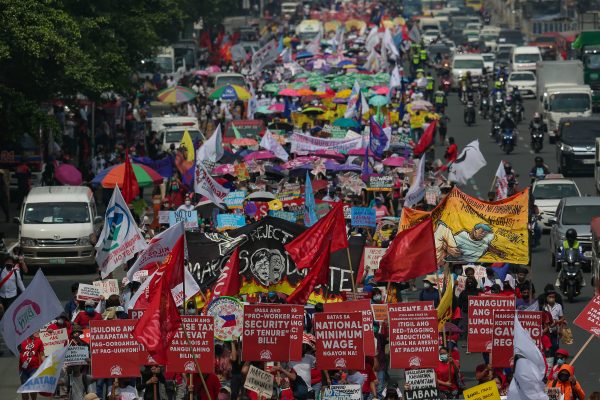Former president Rodrigo Duterte’s daughter Sara was elected as the Philippines’ vice president. In Davao City, Duterte’s son Sebastian is the incoming mayor and another son Paolo is the representative of the city’s first congressional district. President Ferdinand ‘Bongbong’ Marcos Jr’s son Sandro is the representative of Ilocos Norte’s first district and the house of representative’s senior deputy majority leader. His first cousin Martin is the representative of Leyte’s first district and house speaker. The Marcoses and the Dutertes are also allied with other political dynasties like the Villar, Arroyo, Estrada and Cayetano.
To say that Philippine politics is a grand family reunion of the rich and powerful is stating the obvious. Elite interests in the Philippine political system have deep colonial roots. Spanish, American and Japanese colonial governments between the 16th and 20th centuries gave rise to Filipino political clans that pursued their own interests. Their political power and influence increased through the years, widening the gap between the rich and the poor as they perpetuated their stay in office through elections and political appointments.
As that grand family reunion unfolds in the corridors of power, ordinary voters suffer from the impacts of low wages and the rising prices of basic goods and services. There is a crippling transportation crisis. The Philippines is prone to volcanic eruptions and typhoons — 2022 saw natural calamities that resulted in the displacement of families from their homes and livelihood, and significant loss of life.
The more that political clans claim ownership of national and local positions, the more they are inclined to abuse power and engage in corrupt practices. President Marcos Jr has been criticised for spending significant amounts of time going abroad and partying with friends. Within his first 100 days in office, key officials resigned due to controversies like unauthorised sugar importation.
While the Marcos Jr administration is not being asked to solve long-standing problems immediately, the first few months of 2022 were the time to provide a clear plan on how to move the country forward. Instead, officials recommended laughable policy ‘solutions’ to the pressing problem of food affordability.
Iloilo’s first district legislator Janette Garin said that people should start eating kamote (sweet potato) instead of rice as it is said to be cheaper, easier to grow and more nutritious. Ilocos Norte representative Ferdinand Marcos said that rice farmers should plant dragon fruit to increase their income.
Representative Rodante Marcoleta suggested that research be conducted on astronaut food pills that the poor can take to assuage their hunger. Camiguin Representative Jurdin Romualdo asked the Department of Science and Technology if a volcano can be punctured to avoid eruptions. In December, Department of Agriculture spokesperson Rex Estoperez said that people are better off buying only what they can afford as the price of onions continues to skyrocket.
These ‘solutions’ expose the Marcos Jr administration’s lack of a long-term program to help the poor. Officials resort to media soundbites even if their remarks turn out to be controversial, misleading or outright lies. The Filipino derogatory term for their behaviour is mema, a portmanteau of may masabi lang (just to say something).
Critics of the Marcos administration, including the media, are subjected to various forms of harassment and intimidation. The murder of a popular broadcast journalist in October 2022, for example, hogged international headlines. The red-tagging of certain groups and individuals persists even though the Marcos Jr administration initially promised to put a stop to it. This compromises the safety and security of those accused of having links with communist and terrorist groups.
Fighting back has become the ‘new normal’ as concerned journalists and media workers take the government to task for its failure to protect basic freedoms, including press freedom and freedom of expression. Educators, for their part, attempt to distort Philippine history by deodorising the evils of Martial Law. Human rights defenders continue to criticise Marcos Jr for violations of the people’s basic rights, even bringing these violations to the attention of the United Nations.
Resistance from various sectors had some gains in 2022. For example, three activists were released from detention after three years, reuniting with their families and friends in time for Christmas. Public outcry was key to speeding up an investigation into the killing of a hard-hitting broadcast journalist, even though high-ranking government officials are among those accused. The challenge remains to sustain these gains as new problems arise, overshadowing or further complicating long-standing ones.
The year 2022 is not only an election year in the Philippines but also a reflection of the unending social crises exacerbated by the return of the dictator’s son. The Marcos-Duterte alliance and other political dynasties consolidate their power and influence through a dynasty cartel, all at the expense of the people they vow to serve. As expected, resistance continues as the suffering persists.
Danilo Araña Arao is Associate Professor at the Department of Journalism, the University of the Philippines Diliman, Special Lecturer at the Department of Journalism, the Polytechnic University of the Philippines Santa Mesa, Associate Editor at Bulatlat Multimedia and Editor at Media Asia.
This article is part of an EAF special feature series on 2022 in review and the year ahead.

